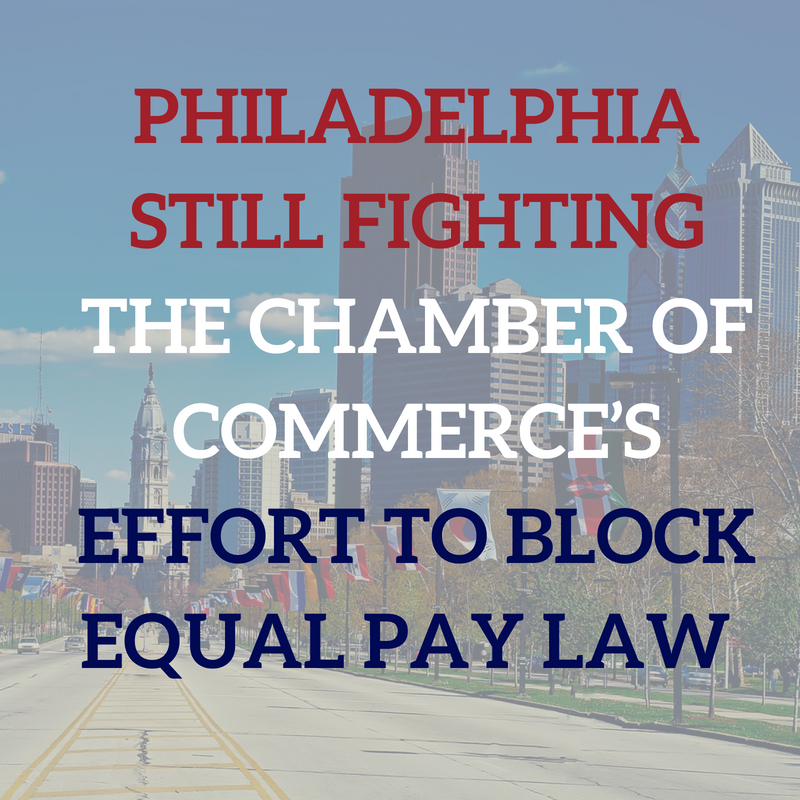
Both the City of Philadelphia and the Chamber of Commerce are appealing a federal judge’s recent ruling on a prior-wage equal pay ordinance signed into law by Mayor Jim Kenney in January 2017.
As we told you back in early May, a U.S. District Court for the Eastern District of Pennsylvania issued an order granting in part and denying in part a motion for a preliminary injunction seeking to block the City of Philadelphia’s wage equity ordinance. The lawsuit and motion were filed by the Chamber of Commerce for Greater Philadelphia on behalf of members such as Comcast Corporation, Children’s Hospital of Philadelphia, and Drexel University and challenged the ordinance on First Amendment grounds.
The ordinance, introduced by Councilman Bill Greenlee, banned employers from inquiring about an applicant’s prior pay and from relying on that information to set wages.
The ruling was a split decision. The judge granted the Chamber’s request for a preliminary injunction with respect to the provision that would have prohibited employers from asking a prospective employee their salary history, finding that the Chamber would likely succeed in its First Amendment challenge to this provision.
But there was good news, too: The judge simultaneously denied the Chamber’s request for a preliminary injunction regarding the second provision, which prohibits employers from relying on such information while setting salary, finding that this provision does not target speech.
As reported in Vox:
Asking applicants how much money they earned at previous jobs has long been a routine part of the hiring process. But this seemingly harmless question is a key culprit in the persistent gender wage gap in the United States, according to a growing number of civil rights groups and legal experts.
Businesses decide what to pay new hires based partly (or entirely) on how much they earned at their last jobs. Because women are generally paid less than their male co-workers, for reasons that include discrimination, asking female job candidates about their past salaries nearly guarantees that the wage disparity will continue throughout their careers. The same dynamic disadvantages workers of color.
Last year, WLP Managing Attorney Terry L. Fromson and Staff Attorney Amal Bass authored and filed an amicus (“friend-of-the-court) brief supporting the prior-wage equal pay ordinance on behalf of 27 organizations devoted to addressing sex discrimination, including wage discrimination.
Read our brief here.
We disagree with the judge’s ruling on the provision that would ban asking applicants their salary history, and support the City of Philadelphia’s appeal.
“It is commercial speech,” Fromson explained to KYW NewsRadio, “that must be banned to prevent employers from engaging in unlawful activities: the reliance on a prior wage to establish discriminatory wages.”
“The fact is that Philadelphia’s prior wage ordinance is based on both evidence and legal precedent,” says Fromson. “The wage gap exists and discriminatory pay is perpetuated when employers request and rely on prior pay to set salary.”
As Fromson stated, the current split decision leaves employers in a bizarre position. Legally, they can ask about prior wages, but they open themselves to claims of discrimination if they use the answer to set wages.
The Philadelphia businesses trying to block this equal pay effort initially refused to identify themselves in court documents. They revealed themselves only after a judge dismissed the original complaint in this case on the grounds that the Chamber hadn’t identified a single business the ordinance would harm.
The Chamber of Commerce refiled the case, indicating that the businesses fighting Philadelphia’s equal pay ordinance include:
- Comcast Corp.
- Bittenbender Construction
- Children’s Hospital of Philadelphia
- Liberty Property Trust
- Delaware Valley LLC
- Drexel University
- Jacobson Strategic Communications
- FS Investments
- Sandmeyer Steel Company
- Diversified Search
- Chamber of Commerce for Greater Philadelphia
- ESM Productions
- Day & Zimmermann
Stay tuned for updates.
The Women’s Law Project is a public interest law center in Pennsylvania devoted to advancing the rights of women and girls.
Sign up for WLP’s Action Alerts here. Follow us on twitter and like us on Facebook.
We are a non-profit organization. Please consider supporting equal rights for women and girls by making a one-time donation or scheduling a monthly contribution.

